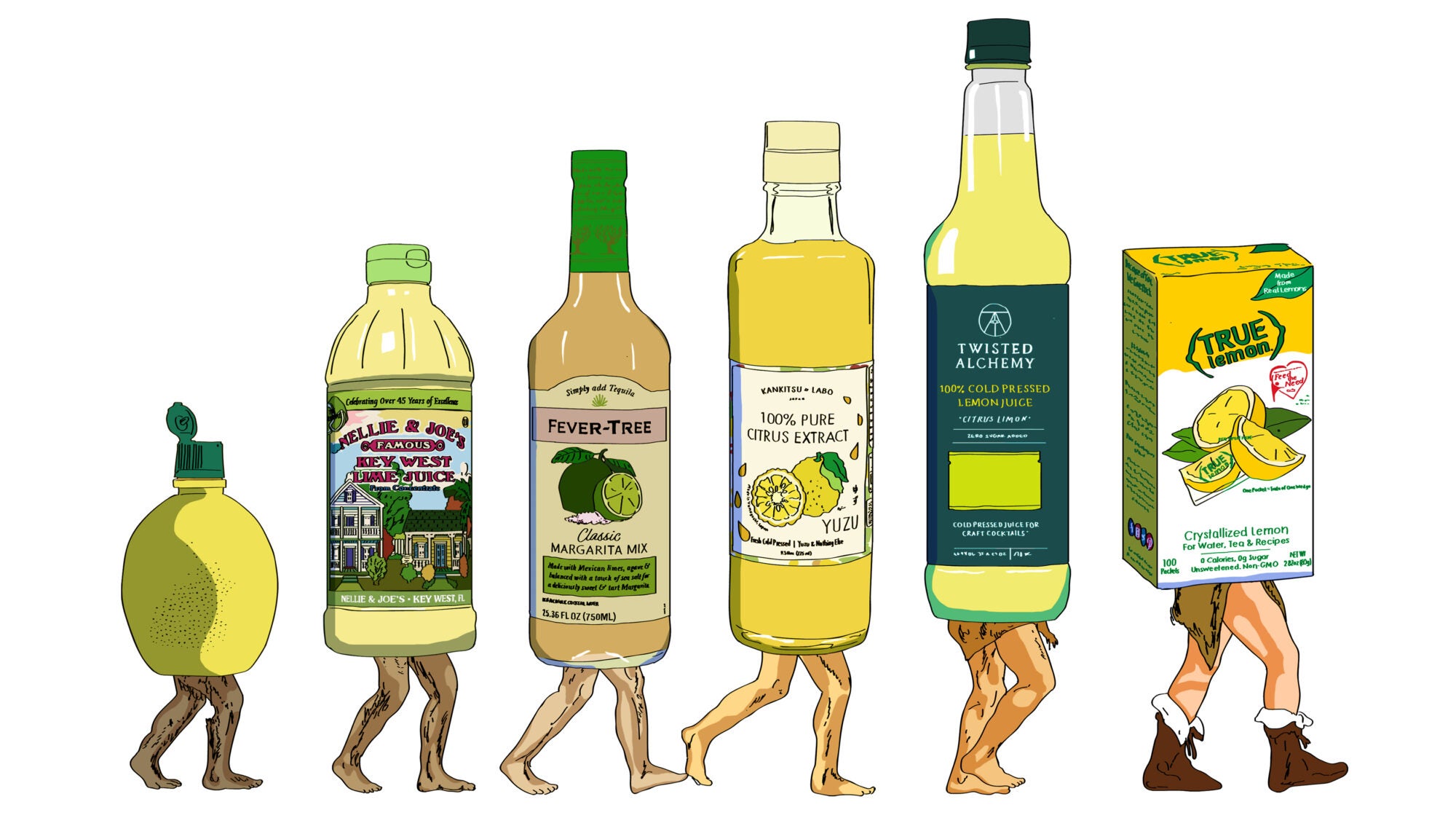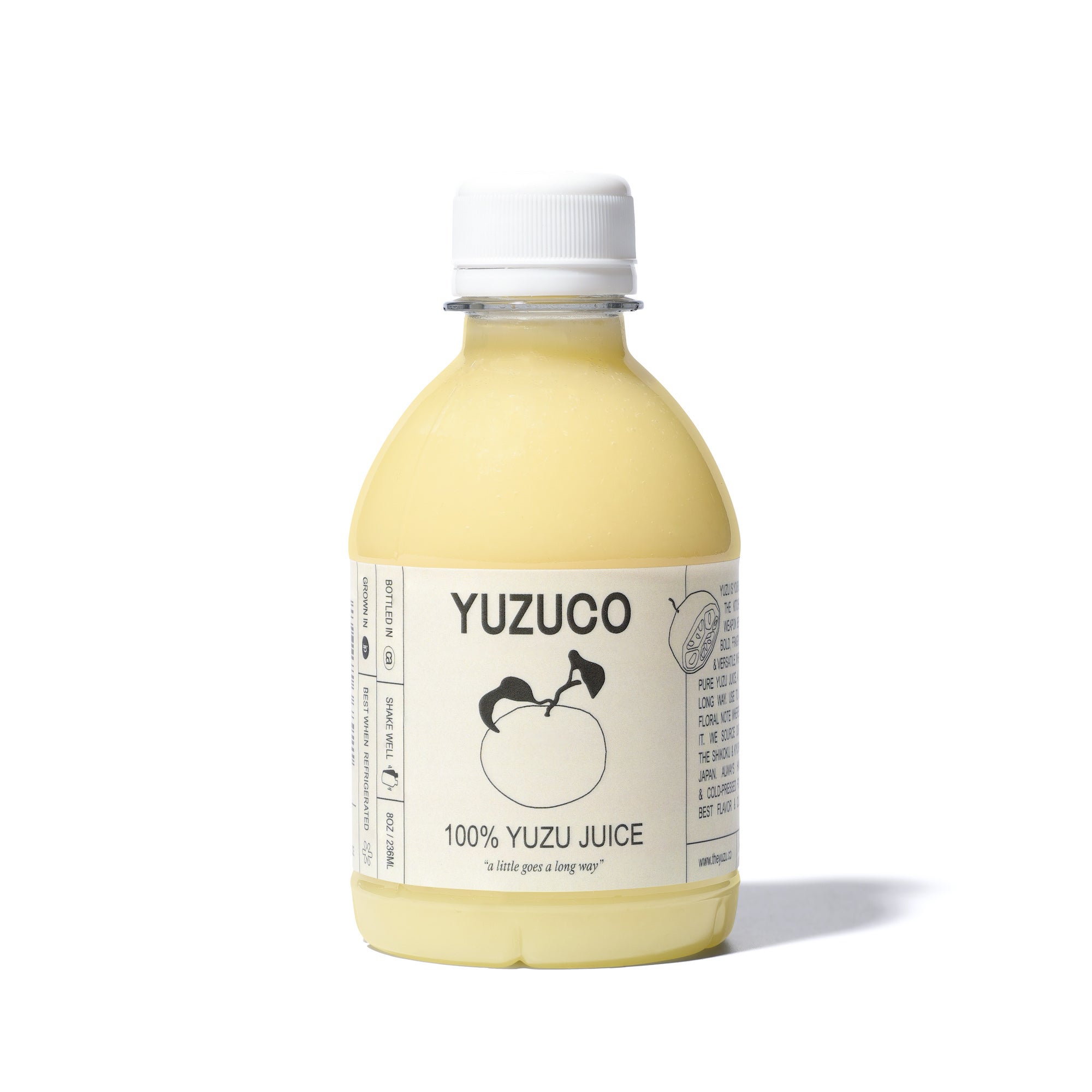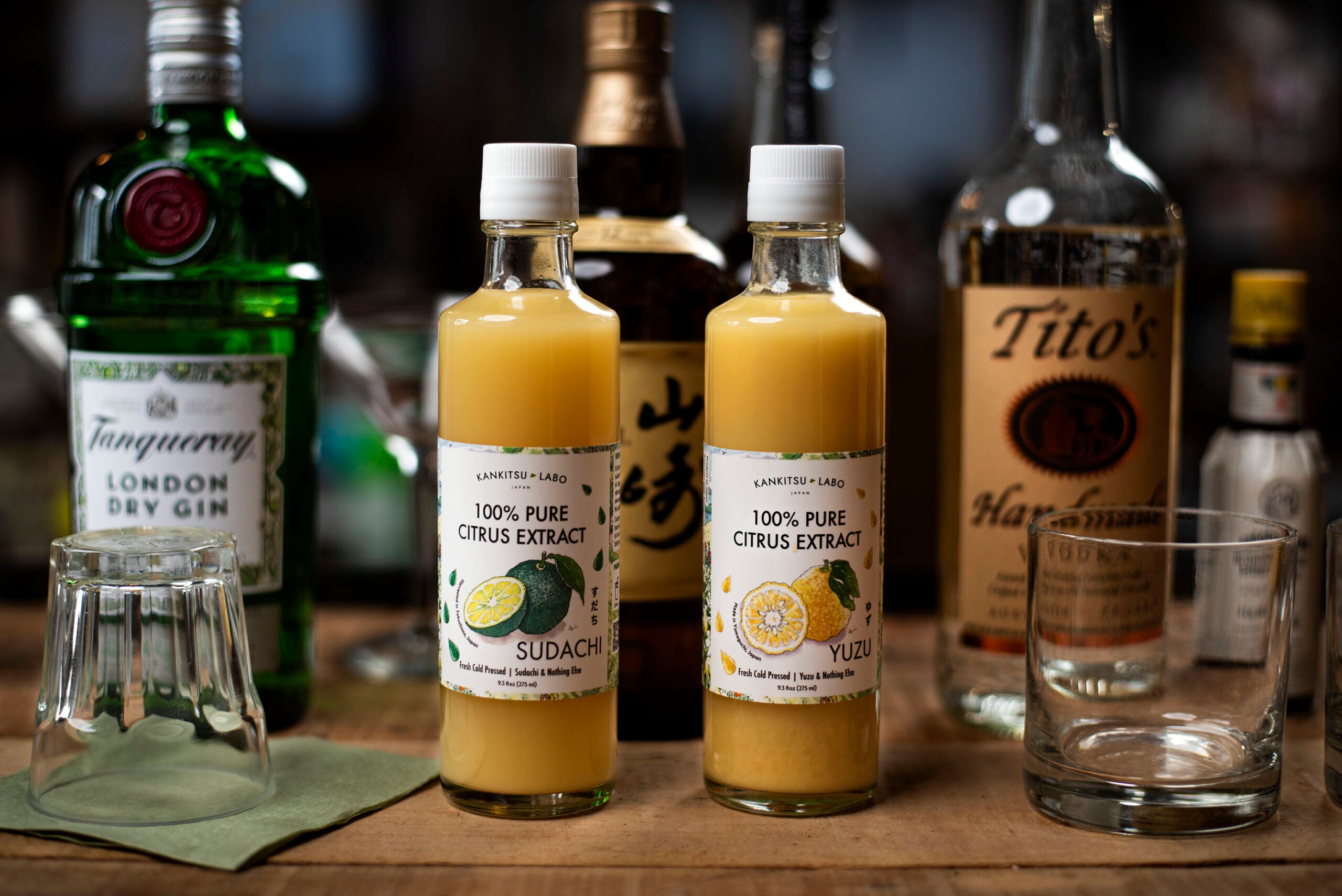
It’s a new era for pre-squeezed citrus, with a grove of new, innovative companies asking for space in your refrigerator.
I’m one of about 8,000 people who have watched a YouTube video called “NEVER Use Bottled Lemon Juice! Here’s why…” The video features a ponytailed figure named Chef Dez, wearing an Apple Watch and a chef’s coat, clinging to the corner of a suburban kitchen island. Fists clenched, he delivers a soliloquy about how angry he gets when he sees someone pull a bottle of lemon juice out of their refrigerator. The laugh track (why is there a laugh track?) goes wild.
Chef Dez is, of course, not alone in vilifying those jolly little lemon- and lime-shaped plastic bottles from the produce aisle. The refrain has been repeated by many of us who work in the profession of writing recipes for salad dressings and loaf cakes and daiquiris—oh, to even think of suggesting processed lemon juice for a French 75. That would get you kicked off the cocktail island of Manhattan. But does this maxim really hold up in an era of ever-evolving convenience innovation?
For me, the fresh-is-better house of cards started to fall apart a few months ago when I made margaritas for friends using a bottle of Fever-Tree margarita mix. The drinks turned out to be shockingly balanced and fresh, with none of the laundry detergent notes I associate with bottled citrus and sour mixes. Was this a scientific breakthrough, or just the sweet taste of not having to flood a countertop with sliced and squeezed lime debris?
As it turns out, many of the innovations in the bottled citrus industry have happened precisely because people hate squeezing limes so much. In fact, Kim and Scott Holstein’s decision to start their bottled citrus brand Twisted Alchemy in 2019 came out of their annual tradition of making gigantic batches of margaritas for their joint birthday parties. Having worked as a bartender in Paris, Scott was familiar with the annoyance of squeezing limes in large quantities. As Kim explains, the labor involved in squeezing the lime juice for a bar is only one part of the equation.
“There are all different shapes, and sometimes the yield from a lime might be half that of other limes. There’s also the varying pricing that happens because you’re getting fruit from a farm.” On top of all this, citrus juice has a notoriously short shelf life (even if you’re following a nerdy tip from bartender Dave Arnold and aging your lime juice).
The Holsteins’ solution was to bottle hand-squeezed citrus juice (machine-squeezing limes introduced too much pith and oil for their taste) and treat it with a preservative process called high-pressure processing, or HPP. Although HPP technology is more expensive than traditional heat pasteurization, the payoff is in the flavor. “It’s a simulation of very intense pressure that enables the enzymes to be maintained but any kind of bacteria to be eliminated,” explains Kim.

Yuzoco sells several bottled products made from yuzu grown in southern Japan.
A 750-milliliter bottle of Twisted Alchemy’s 100% Hand-Squeezed Persian Lime Juice will set you back $25, but it will also save you from buying and squeezing 30 limes and will last for several months in the refrigerator, which is enough of a payoff for Twisted Alchemy customers like Ritz-Carlton, Four Seasons, Marriott, and Disney.
“We work with a lot of bars and restaurants, and when we talk with them about their citrus options, usually a couple of themes come up,” says Basil Beshkov, a cofounder of YUZUCO, a Los Angeles–based brand that sells both directly to consumers and wholesale. “The first is that juicing a ton of citrus is very difficult. From a labor perspective, it’s time-consuming, and even if you have the right equipment, it’s not a fun job, and labor is expensive these days.” Then, of course, there’s the stability of the product.
“A ton of this fresh juice that you paid someone a lot of money to juice is all of a sudden going to go bad if you don’t use it within three days,” he explains.
YUZUCO, which sells several bottled products made from yuzu grown in southern Japan (also treated with HPP technology for stability) solves not only a labor problem but also a problem of availability, since fresh yuzu is difficult to find in the United States and has a low juice yield. Similarly, Kankitsu Labo, which launched in 2022, sells pure bottled juice from Japanese yuzu and sudachi (a lime doppelganger about the size of golf ball, with a distinct aroma that’s often used in ponzu and other savory applications). Since the United States has strict regulations about importing fresh citrus, packaged juice products open up a lot of possibilities for bartenders, pastry chefs, and home cooks like me who want to experiment with the occasional yuzu-tinged ginger beer or sudachi loaf cake glaze.
Baker and author Abi Balingit is a fan of Manila Gold frozen calamansi juice for recipes like the calamansi fish sauce shortbread cookies from her book, Mayumu. “It’s a convenient substitute when I can’t find the fruit at the store.” When the frozen juice is incorporated into certain baked goods, she says, “the heat from baking does help meld the different flavors in your dessert and can make it harder to tell the difference.”

Kankitsu Labo is the citrus of choice for some bartenders.
Stacey Mei Yan Fong, the author of 50 Pies, 50 States, tells me that she leaned heavily on Nellie & Joe’s key lime juice while developing the key lime pie recipe in her book to avoid the constant work of squeezing tiny key limes. “I don’t think, in a blind taste test, you could taste the difference, really, since the pie is made with eggs, sugar, and usually condensed milk,” she tells me. Although fresh citrus makes it possible to garnish with fresh zest, it won’t make or break the final result.
Megumi Hwang, the cofounder of Kankitsu Labo, tells me that even if she lived in Japan, where fresh yuzu and sudachi are easier to find, she would probably default to using bottled juices because of the brief fall harvesting seasons for the fresh fruit. “Let’s say I want to have a sudachi margarita at the beginning of summer, but I just can’t get sudachi. Then a bottle of citrus is very useful for me.”
John deBary, who has worked as a bartender and written several cocktail books, is wary of hard-and-fast rules about making cocktails with fresh citrus. “There are instructions for how to do the best version of something, but there’s always the consideration of, okay, well, who’s the human being who is actually using these instructions? And is there an accessibility issue? Is there an availability issue?” he says.
Even Chef Dez admits that he does actually keep a bottle of lemon juice in his refrigerator to sprinkle over apple slices to keep them from browning. America’s Test Kitchen turns to bottled lemon for jam making because of the consistent levels of acidity. My friend Tammie Teclemariam, a staff writer at New York magazine’s Grub Street, always keeps multiple flavors of True Citrus on hand to add to glasses of water, guacamole, and tacos. She recalls once even making a pasta al True Lemon.
“To say, categorically, that it’s really just wrong to do is, I think, a little unhelpful. It’s much easier to frame it in terms of ‘yeah, it’s better to use fresh juice for these reasons,’” says deBary. “But if you need to, store-bought is fine, to quote Ina Garten.”